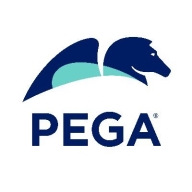

ServiceNow and Pega Platform compete in enterprise IT solutions. ServiceNow holds an edge in ITSM, whereas Pega excels in BPM and CRM functionalities.
Features: ServiceNow offers extensive configurability, clean interfaces, and active product development, supporting its flexibility and customization capabilities. Its ITIL processes and pre-built applications enhance innovation and efficiency. Pega Platform provides strong case management and workflow automation, focusing on reducing coding needs to address complex business processes.
Room for Improvement: ServiceNow could improve its API documentation and user experience for non-IT users while simplifying its reporting and licensing models. Avoiding overly complex customizations that hinder upgrades is advisable. Pega Platform’s UI needs enhancement, along with more industry-specific out-of-the-box solutions. Its cloud presence and licensing structure require refinement, and expanding machine learning features would boost its appeal.
Ease of Deployment and Customer Service: ServiceNow supports public, private, and hybrid cloud infrastructures and offers robust support, though technical support responsiveness varies. Pega Platform facilitates various deployment models, with a more straightforward on-premises setup, but occasionally falters in service quality as it grows and diversifies. Both provide beneficial support structures.
Pricing and ROI: ServiceNow’s high pricing often correlates with its extensive features and adaptability, making it more expensive than local solutions, with ROI seen in IT service management efficiencies. Pega, similarly priced, targets large enterprises and delivers substantial ROI through improved processes and automation if implemented effectively.
The return on investment is good when implementing for ourselves and for other clients.
The technical support from Pega is very low, rating a one or two out of ten.
I never needed support from the platform standpoint, but if additional features are required, we have regular meetings with the product team for feedback.
Pega's technical support team is very helpful.
The support is exemplary and deserves a perfect rating.
Most of the support comes from partners, and customers heavily rely on them.
I have contacted them four to five times over the past two years, and they have been quite helpful.
It is capable of vertical scaling with no issues.
ServiceNow is already a stable tool.
ServiceNow is stable enough.
Pega introduced Constellation, which allows a user to build a more engaging visual experience.
My learning curve in robotics has been challenging.
There is a need for bug or error tracking in ServiceNow.
Their customer support could make it a great solution, not just product support but also their relationship with partners and training initiatives in different regions.
There are sometimes challenges with the portal being a bit confusing for new users.
Pega is priced higher than open-source options like Flowable but is suitable for large-scale industries like banking and insurance.
The pricing is expensive, and this is an issue.
ServiceNow's pricing can be justified if more functionality is required.
ServiceNow is expensive for all regions.
Management capabilities such as dashboards.
Pega Platform is excellent for enterprise-level solutions with integrations to entire systems, including case management, service orchestration, CRM, decision-making capabilities, digital process automation, and AI-driven functionalities.
ServiceNow provides a wide range of functionality, covering all the necessary modules, unlike Jira which is primarily for IT.
Automation capabilities are impressive, bolstered by a vast repository of out-of-the-box connectors and plugins that facilitate integration with various applications worldwide.
The most valuable features of ServiceNow for me are its ticketing and reporting capabilities.


Pega Platform facilitates business process management, case management, and workflow automation for industries like banking, insurance, and healthcare. It supports digital transformation and customer service enhancements with its low-code capabilities and seamless integrations.
Pega Platform enables users to create efficient systems for case management, financial operations, and digital transformations. It provides tools for client onboarding, quoting, claims processing, customer experience improvements, and content management. Pega's low-code approach allows for the automation of complex processes, making it suitable for enterprises looking for adaptability and rapid deployment. While it offers strong real-time analytics and decision automation, users acknowledge challenges in user interface, integration, and performance aspects. High costs and a learning curve need attention, and enhancements in AI features and cloud services are desired.
What are the key features of Pega Platform?In banking, Pega Platform automates loan processing, accelerates customer onboarding, and manages compliance. Insurance companies benefit from streamlined claims processing and policy management. Healthcare sectors use the platform for patient engagement and care coordination, enabling organizations to adapt quickly to changing industry requirements.
ServiceNow is a cloud-based task-management platform that specializes in IT operations management (ITOM), IT services management (ITSM), and IT business management (ITBM). ServiceNow allows users to manage their teams, projects, and customer interactions using a variety of different plugins and apps with which it easily integrates.
ServiceNow offers prebuilt applications to support any process, as well as a framework and tools that allow you to build your own.
ServiceNow’s service management solutions include change, request, incident, problem, and cost management, as well as HR, IT, field service, and facilities management solutions. They also cover business management solutions such as vendor performance management, financial management, performance analytics and project portfolio suite, as well as governance, risk, and compliance.
“The Smarter Way to Workflow”
ServiceNow’s activities, processes, and tasks are overseen as part of a comprehensive managed workflow that supports such features as real-time collaboration, communication, and resource sharing. ServiceNow’s suite of products allow for operation using serverless computing, and include the categories of Business Apps, Customer Service, HR, IT, and Security.
ServiceNow can be used to support most workflows because of the wide range of tools it offers. These include on-suite ticketing tools, predictive modeling to manage workflows, and benchmarking for the tracking of progress. ServiceNow can assist with artificial intelligence and machine learning processes and can be used to organize the cases of a help/service desk as well as for instance management and problem management. It also smoothly integrates with many legacy systems.
ServiceNow offers service management software for industries including:
Cloud services
Education
Financial services
Government
Healthcare
Manufacturing
Telecommunications
Reviews from Real Users
PeerSpot users prefer ServiceNow to its competitors because of its scalability, stability, and ease of use. It helps everyone in the company to be on the same page by creating a single source of record across all departments. One user stated that “I’ve definitely used over 20 project management solutions, but they can't be compared with ServiceNow.” Another said that “ServiceNow is an industry leader in multiple areas and provides an excellent ROI.”
We monitor all Rapid Application Development Software reviews to prevent fraudulent reviews and keep review quality high. We do not post reviews by company employees or direct competitors. We validate each review for authenticity via cross-reference with LinkedIn, and personal follow-up with the reviewer when necessary.